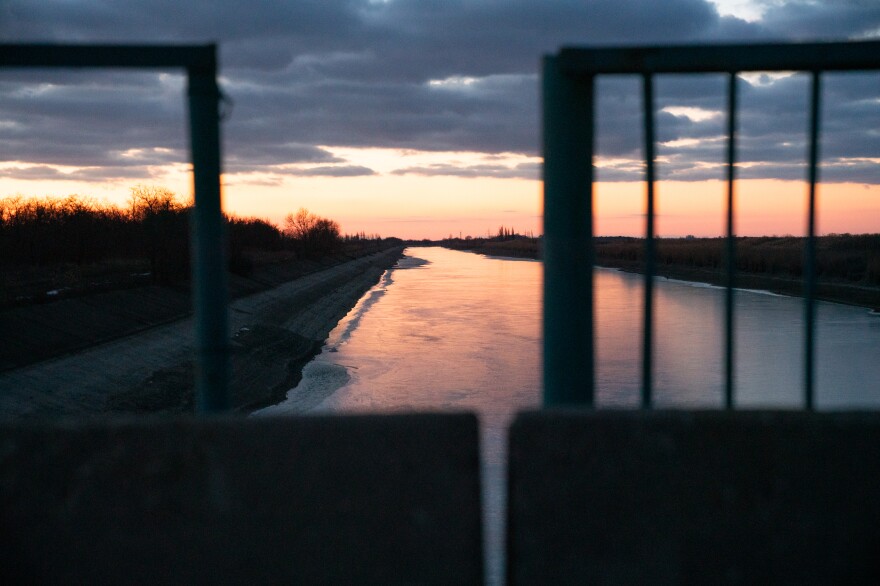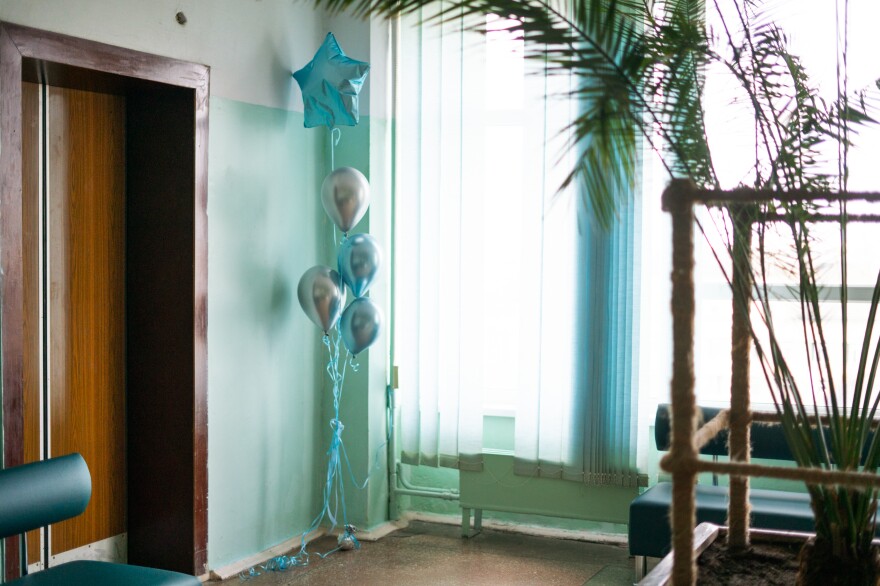CHONHAR CROSSING, Ukraine — Oleg dragged his suitcase down a long cement road, crossing from a territory Russia invaded eight years ago to a territory Russia may be preparing to invade, to go visit his mother-in-law.
He had set off from his home in Crimea, passing a Russian military convoy along the way. Nearing the boundary, he walked past an abandoned hotel from the days before the hostilities, when Crimea's Black Sea resorts were a top vacation destination. Then he showed his papers to the armed Ukrainian guard on the other side, and waited for a lift next to little stray dogs and a row of dried fish dangling from the open trunk of a merchant's car.

The residents of Crimea and the Ukrainian borderlands have seen up close what happens when Russia invades. As Russia dispatches more air and ground forces and warships to the area, they worry about what may come, but embrace a hardened sense of national identity.
"Nobody wants to fight with Russia. This is like a fight with a wall, you know? You cannot win," Oleg said, giving only his first name, fearing Russian arrest back home in Crimea. "This fight, already lost. The war, not finished. The war is not lost."
The war of which he speaks is for the hearts and minds of Ukrainians. Should Ukraine stick with the West and distance itself from its Russian neighbor? Or would it just be easier to give in to a Russian bear hug?


A Ukrainian port town is now under patrol
A half-hour drive from the checkpoint up the Ukrainian coast is the small port town of Henichesk. U.S. officials warn Russian warships could seize Ukrainian ports on these shores.
On a recent weekend morning, Yelena Korniyenko strolled with her daughter and baby grandson along the Sea of Azov, bundled up against the cold but enjoying bright sunshine and a fresh breeze.


"We can see that more Ukrainian military troops are coming. They're patrolling the city. They're patrolling the sea. And we feel their protection," Korniyenko says, looking out across the water. "We are hoping for common sense from Vladimir Putin."
That day, the main headline in the local newspaper, the Priazovia Bulletin, reads: "Henichesk Port Could Be Turned Into a Military Port." Russian warships are now conducting exercises nearby.

The Crimea annexation was a surprise
Putin's 2014 annexation of Crimea still baffles many in the borderlands between Ukraine and Russia. For years, they had viewed Ukrainians and Russians as entwined in a kinship, sharing language, culture and family.
"Here, we thought that, wow, Ukraine, Russia, we're the brothers," said Mykola Stavytskyi, who is half-Russian and lives in the Ukrainian city of Kherson, close to Crimea. "Everybody couldn't believe about the occupation of Crimea. In that moment, we understood, first time maybe, that we are Ukrainians."

The turmoil was triggered when Ukraine's pro-Russian president pursued a trade agreement with Russia rather than the European Union. Protests erupted in the Ukrainian capital and spread even to Kherson. Stavytskyi joined the crowds in the streets.
Then Russia occupied Crimea and triggered a separatist war in Ukraine's east. Stavytskyi became a combat soldier fighting the Russian-backed separatists, serving in the trenches with Ukrainians of diverse backgrounds — soldiers who did not have much in common beforehand.
A common enemy helped solidify their Ukrainian identity.
"They talk in different languages. They go in different churches. But they understand that they are one Ukrainian nation," Stavytskyi said. "Thanks, Putin."

How to fight back? Block the water
When Russia took Crimea, it cut off a gas supply to Ukraine. Then Ukraine blocked Crimea's main water supply.
Andrii Hordieiev, former governor of Kherson and former lawmaker in Ukraine's parliament, shows off a sandbag dam over a deep canal that used to provide most of Crimea's water. A newer, sturdier cement dam is right behind the Ukrainian checkpoint leading into Crimea.

This caused a drought in Crimea. But now Russia is building a new water pipeline to solve the crisis, leading Ukrainians to consider other tactics to challenge Russia's presence.
"Our goal is, of course, to get back all occupied territories, including Crimea ... I don't think that it's going to be successful if we launch a war to get it back," Hordieiev said, sitting in a car close to the boundary line with Crimea. "Our main task is maybe not to get the territories back, but also to get people back."

A university tries to shape the next generation
A few hours' drive north of the boundary line with Crimea, Kherson State University positions itself on the front lines of the battle against Russian influence.
University administrators say many students in the region used to travel to study in Crimean universities where the climate is warm. Now Kherson State University has built a small medical school to make up for what was lost when Crimea was cut off from their region.

The hallway to the rector's office is lined with portraits of former rectors from the university's 105-year-old history, offering a reminder of darker days under Soviet dictatorship. University administrators point out rector after rector who served just one year before being killed under Soviet leader Josef Stalin.
The current rector, Oleksandr Spivakovsky, says about a fifth of the population in his area is sympathetic to Russia, describing it as an older generation that was educated under the Soviet Union.
His focus, he says, is strengthening the civil Ukrainian identity of "Generation Z" — kids who have grown up in the borderlands next to Russia and speak primarily Russian, not Ukrainian.

"We know we will be OK because we are not the people that are going to be with Russia," said one student, Yuliia Vorobiova.
"I consider myself, like, mixed. So I speak Russian really good. I like it that way," said another student, Vitaliy Shutov. "The Russian government is the problem, I think, not the people."
Ievgen Afanasiev contributed to this report.
Copyright 2023 NPR. To see more, visit https://www.npr.org.





